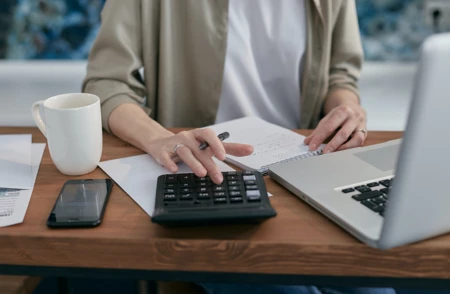A key aspect to good financial health is regularly assessing your affordability, as this will give you a good idea of where you stand. We’ve put together a series of tips for assessing your finances, so you can be in the best possible position when it comes to getting a mortgage:
1. Set a budget
Outline a detailed budget that incorporates your income, expenses, and savings. These can then be further broken down into essentials (such as utility bills, groceries, etc) and non-essentials (streaming subscriptions, eating out). This will give you a clear idea of what finances you can set aside each month in terms of disposable income and savings, and can help you avoid overspending.
2. Check your credit score
Assessing your credit score on a regular basis will give you - and future lenders assessing your mortgage application - a better idea of how well you manage your finances, and open doors to more competitive interest rates. To improve your credit score, make sure to pay your bills on time, avoid maximising your credit limit, and checking for any mistakes on your credit report.
3. Establish your savings goals
We never know what may be around the corner, which is why it’s a good idea to have a sufficient savings pot set aside for emergencies. Having a safety net of three to six months’ worth of living expenses will provide you with peace of mind should you find yourself out of work due to redundancy, ill health, or bereavement. It’s also good practice to have longer-term savings goals, such as a retirement fund or a deposit for a home.
4. Consolidate your debt
Wherever possible, you should look to consolidate your debts into a single, more manageable loan. Before proceeding, make sure that you carefully evaluate the terms of your loan to ensure that you can meet your payments on time each month, and that it aligns with your financial goals.
5. Establish a routine
Creating healthy financial habits can be made much easier if you establish a good routine from the offset. By regularly checking in on your finances on a weekly basis, you can make sure that your savings goals are on track, that you’re sticking to your budget, and adjust any areas that aren’t working so well.
Sticking to these tips will ensure you’re in a good place financially and allow you to make more informed decisions to secure a stable future. It also means when you’re ready to apply for a mortgage, your affordability will be in a much stronger position, getting you on your way to securing the home of your dreams.
Important information
Your home may be repossessed if you do not keep up repayments on your mortgage.
There may be a fee for mortgage advice. The actual amount you pay will depend on your circumstances. The fee is up to 1% but a typical fee is 0.3% of the amount borrowed.



